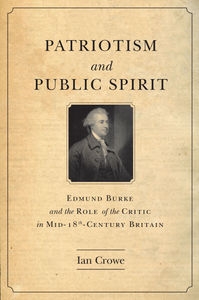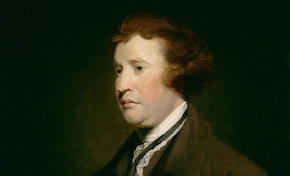 Eighteenth century British politician Edmund Burke was one of the great minds in the history of political theory, and his writing continues to inspire and inform political philosophies today. One of Burke’s contemporary champions, noted scholar Ian Crowe, will lecture on “Edmund Burke: His Life and Thought” on Monday, October 6, at 7:00 p.m. in Hynson Lounge, Hodson Hall, on the Washington College campus, 300 Washington Avenue.
Eighteenth century British politician Edmund Burke was one of the great minds in the history of political theory, and his writing continues to inspire and inform political philosophies today. One of Burke’s contemporary champions, noted scholar Ian Crowe, will lecture on “Edmund Burke: His Life and Thought” on Monday, October 6, at 7:00 p.m. in Hynson Lounge, Hodson Hall, on the Washington College campus, 300 Washington Avenue.
Sponsored by the College’s Institute for Religion, Politics, and Culture, the talk is free and open to the public.
Born in Ireland in 1729, Edmund Burke studied at Trinity College in Dublin before launching his career in politics and political philosophy. He served 29 years in the British Parliament and became a chief architect of the British Conservative tradition. Known for his strong opinions on issues of the day, he sympathized with the colonial grievances that led to the American Revolution and was critical of the leaders of the French Revolution. His Reflections on the Revolution in France was one of the most controversial and talked about books of his day. Many of Burke’s observations live on more than 215 years after his death, including, “Those who don’t know history are destined to repeat it.”
Ian Crowe is author of Patriotism and Public Spirit: Edmund Burke and the Role of the Critic in Mid-Eighteenth-Century Britain (2012, Stanford University Press). He serves as secretary of the Edmund Burke Society of America and is executive editor of its academic journal Studies of Burke and his Times. Crowe holds a bachelor’s degree from St. Catherine’s College, Oxford University, and earned his doctorate in intellectual history from University of North Carolina at Chapel Hill. He serves as a research fellow for the Institute of Religion, Politics, and Culture at Washington College, which studies how religion impacts politics and shapes history.



Write a Letter to the Editor on this Article
We encourage readers to offer their point of view on this article by submitting the following form. Editing is sometimes necessary and is done at the discretion of the editorial staff.